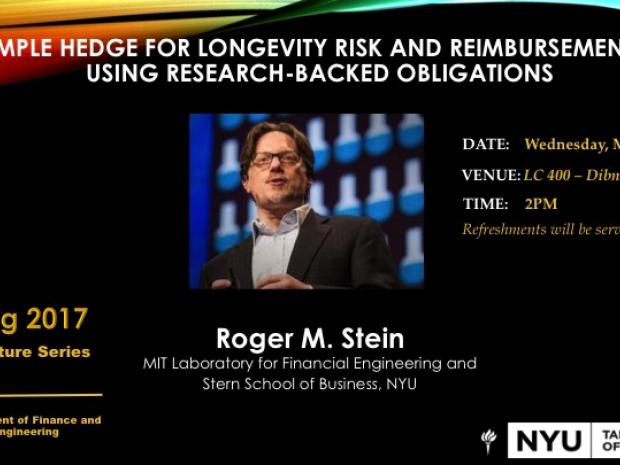A Simple Hedge for Longevity Risk and Reimbursement Risk Using Research-Backed Obligations

Dear All,
You are cordially invited to attend a lecture given by Roger M. Stein, of MIT Laboratory for Financial Engineering and Stern School of Business, who will discuss "A Simple Hedge for Longevity Risk and Reimbursement Risk Using Research-Backed Obligations."
Bio:
Roger M. Stein has been actively engaged in developing, implementing and writing about new approaches to applied risk modeling and financial prediction for almost 25 years. He and his teams have developed services that have become industry benchmarks in banking and finance. His current research interests are in the areas of systemic risk, model risk and validation, biomedical funding, and the interface between data mining and financial theory. He is also a Senior Lecturer in finance at the MIT Sloan School of Management and holds the position of research affiliate at the MIT Laboratory for Financial Engineering. He was the Chief Analytics Officer at State Street GX as well as Senior Managing Director of Product Strategy. Before this he was Managing Director of Research and Academic Relations globally for Moody’s Corporation and prior to this President of Moody’s Research Labs. Dr. Stein is on the editorial boards of several finance journals. He is also the founder and president of the Consortium for Systemic Risk Analytics and a member of the Advisory Council of the Museum of Mathematics; the Board of PlaNet Finance, USA, and the Academic Advisory Board of the EC’s SYstemic Risk Tomography Project (SYRTO). Dr. Stein holds a PhD and master’s degree from the Stern School of Business, New York University.
Abstract:
A Simple Hedge for Longevity Risk and Reimbursement Risk Using Research-Backed Obligations Longevity risk is the risk that the promised recipient of lifetime cashflows ends up living much longer than originally anticipated, thus causing a shortfall in funding. A related risk, reimbursement risk is the risk that providers of health insurance face when new and expensive drugs are introduced and the insurer must cover their costs. Longevity and reimbursement risks are particularly acute in domains in which scientific breakthroughs can increase the speed of new drug development. An emerging asset class, research-backed obligations or RBOs (cf., Fernandez et al., 2012), provides a natural mechanism for hedging these risks: RBO equity tranches gain value as new life- extending therapies are developed and do so in proportion to the number of successful therapies introduced. We use the stylized case of annuity underwriting to show how RBO equity could be used to hedge some forms longevity risk on a retirement portfolio. Using the same framework, we then show how RBO securities may be used to hedge a much broader class of reimbursement risks faced by health insurance firms. We demonstrate how to compute hedge ratios to neutralize specific exposures. Although our analytic results are stylized, our simulation results suggest substantial potential for this asset class to reduce financial uncertainty for those institutions exposed to either longevity or reimbursement risks. For example, our simulation results indicate that the correlation between the return on RBO equity and the reimbursement shortfall for a health insurer is about 0.66 under reasonable assumptions. Even under extremely conservative assumptions, this correlation is still 0.34, suggesting that RBO equity offers substantial hedging benefits, producing more favorable outcomes in about 87% of scenarios.
We hope you can make it!
Space is limited! Please register for this event by clicking the button below:

